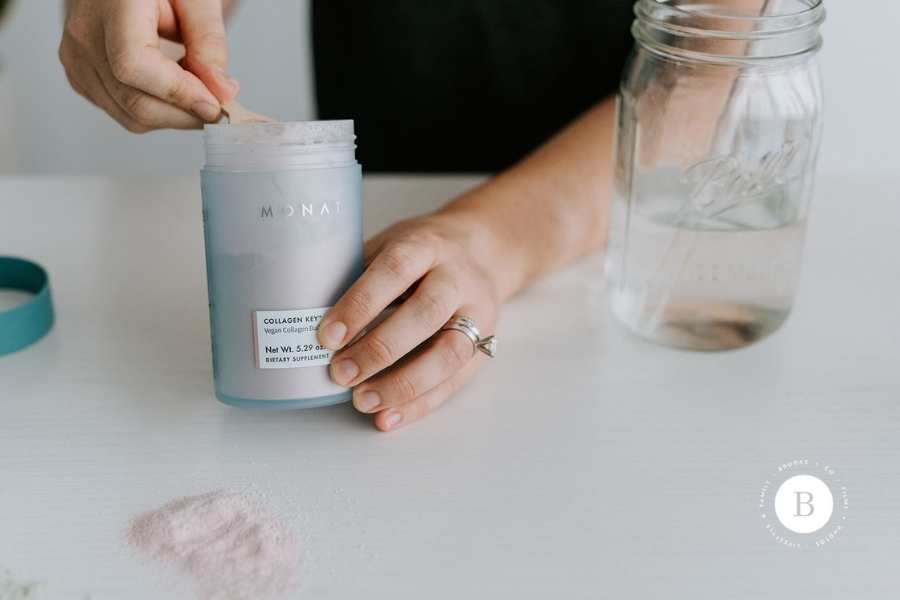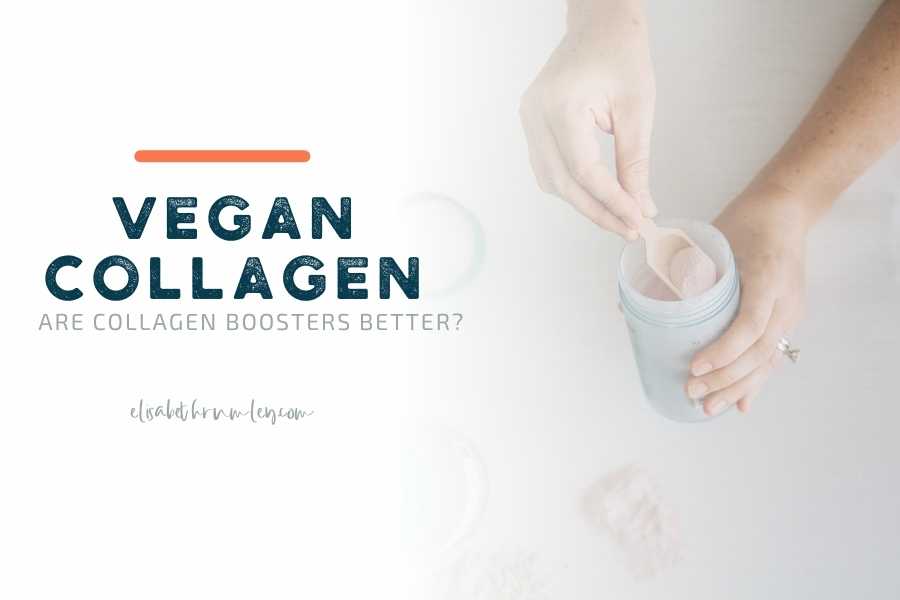For centuries, Chinese women have considered collagen the fountain of youth and have been eating collagen-rich foods like pigs’ feet, donkey skin, and shark fins. In 2020, in the United States alone, consumers are expected to spend $293 million on collagen supplements. Typically, collagen came from animal sources like beef or fish. But now, new science makes vegan collagen supplements possible. Keep reading to hear what I’ve found on vegan collagen supplements and vegan collagen “boosters.” It turns out vegan collagen supplements may be safer than their animal-derived alternatives. Can we keep our skin youthful without eating donkey skin?
Why Collagen Supplements?
Collagen is one of the most common proteins in the body and helps give our skin, bones, muscles, tendons, and ligaments their structure. The word collagen comes from the Greek word “kólla,” which means glue.
Nineteen different amino acids make up collagen. The most abundant amino acids in collagen are glycine, lysine, and proline. Later in this blog, you’ll see these amino acids referred to as “collagen precursors.”
As we age, our bodies produce less collagen and collagen of lower quality. Around age 20, women begin losing 1% of collagen per year and as much as 30% during the first five years of menopause. Also, things like overeating sugar, getting too much sun, and smoking cigarettes can damage and destroy collagen. It makes sense that so many women are purchasing collagen supplements.
There are three areas where collagen supplements appear helpful:
- Increasing muscle mass and strength
- Slowing the progression of arthritis
- Improving skin appearance (reduced fine lines and wrinkles) and elasticity
For the rest of this blog, we will focus on how collagen supplementation may benefit the skin and reduce aging signs.
Do Collagen Supplements Work For Skin?
There is some controversy as to the benefits of collagen supplements. First, let’s look at what we do know:
- In this study, drinking collagen daily for 60 days reduced visible skin dryness and wrinkles.
- This review concluded that “preliminary results are promising for the short and long-term use of oral collagen supplements for wound healing and skin aging.”
- Here, 69 women ages 35 to 55 found that those who took 2.5 or 5 grams of collagen daily showed improved skin elasticity daily for eight weeks than those who didn’t take it.
- Another found that women who took 1 gram per day of a chicken-derived collagen supplement for 12 weeks had 76% less dryness, 12% fewer visible wrinkles, better blood flow in the skin, and a 6% higher collagen content.
As you can see, most of the research on collagen shows subjective results. But, isn’t this almost always the case when it comes to beauty and wellness products? If you’re like me, a good before and after picture or a personal testimony from a trusted source helps with buying decisions for these products.
Why Vegan Collagen?

Photo by Brooks + Co https://www.bybrooksandco.com/
Many physicians argue that collagen has been around for a long time and should be considered harmless. But, consumers and dermatologists have safety concerns. Much of the apprehension stems from the fact that collagen is typically animal-sourced.
Consuming animal-sourced collagen supplements or precursors has the following concerns:
- Heavy metal contamination when collagen comes from animals in concentrated animal feeding operations.
- Cows could carry diseases like bovine spongiform encephalopathy (BSE) or mad cow disease. ***after a 2016 ban by the FDA, this is only a concern if you supplement collagen by consuming gelatin.
- Animal sourced collagen isn’t in a form your body can use. Your body has to break it down into the amino acid building blocks of collagen and then use it to create collagen.
For these reasons and an increase in veganism for health, moral, or religious reasons, vegan collagen supplements are gaining popularity. When it comes to Vegan collagen supplements, you have several different strategies for supplementation. Let’s discuss this.
The Collagen Diet (Plant-Based Version)
The good news is that plants contain collagen too! (Since this blog is about vegan collagen supplements, I’m only focusing on plant-based collagen sources you can incorporate into your diet).
Following a plant-based “collagen diet” means avoiding sugar and refined carbs and consuming food rich in amino acid collagen precursors or vitamins/minerals that stimulate collagen production.
Plant-based foods high in all three amino acids include:
- soy products: tempeh, tofu, and soy protein
- black beans
- kidney beans
- many other legumes
- seeds: especially pumpkin, squash, sunflower, and chia
- nuts: pistachio, peanut, and cashew
Collagen boosting vitamins and minerals:
- Vitamin C
- Ginsing
- Zinc
- Resveratrol
Vegan Collagen Supplements Are Rare
Instead of being sourced from animals, scientists can produce vegan collagen in a lab:
- Binding together corn, soy, and wheat protein fibers result in a vegan amino acid that structurally mimics animal-derived collagen. You’ll see this used in topical cosmetic products.
- Genetically modified yeast and bacteria can mimic animal-derived collagen.
But this science is pretty new. Finding actual vegan collagen products or supplements in stores near your or at an affordable price is still a challenge. It’s coming, but I don’t think we are there yet. More commonly, you will see vegan collagen supplements advertised as “collagen boosters”. Let’s talk about this.
Vegan Collagen Boosters
Since actual vegan collagen is hard to come by, most companies sell collagen boosters as supplements. Collagen boosters contain the individual amino acids needed for the body to produce collage (glycine, lysine, and proline, etc.) and other vitamins and minerals that support healthy collagen production. Collagen boosters come as powders mixed with liquid daily or capsules or tablets taken once daily.
Monat Collagen Key

Photo by Brooks + Co https://www.bybrooksandco.com/
As a Market Partner with Monat, I got early access to Collagen Key, a vegan collagen booster. Collagen Key contains vegan-sourced amino acids to support collagen production*. It also contains vitamin c, b vitamins, biotin, resveratrol, and hyaluronic acid to encourage the healthy appearance of hair, skin, and nails*.
Collagen Key is peach berry flavor and mixes easily in 8 ounces of water; tastes great. I also like to mix it with Energy or Greens. I’ve been using it for the past month and have noticed improvements in my hair, skin, and nails, similar to when I used animal souced collagen supplements a few years ago. But, this product is vegan, tastes much better, and is less expensive for me. I’m happy with it and will keep using it.
*FDA Disclaimer: These statements have not been evaluated by the Food and Drug Administration. These products are not intended to diagnose, treat, cure, or prevent any disease.
My Final Thoughts on Vegan Collagen Supplements
Based on everything I learned while writing this blog, I’m no longer comfortable using animal-sourced collagen supplements. If you are looking for healthier hair, skin, and nails through collagen supplementation, I encourage you to consider a plant-based collagen diet. I also recommend a vegan collagen booster supplement. This best supplement is one that you love to take every day, but I’m currently loving Monat Collagen Key.
I hope you found this information helpful. Feel free to reach out if you have any questions on this topic or particular products. Either way, I’m happy to help.









